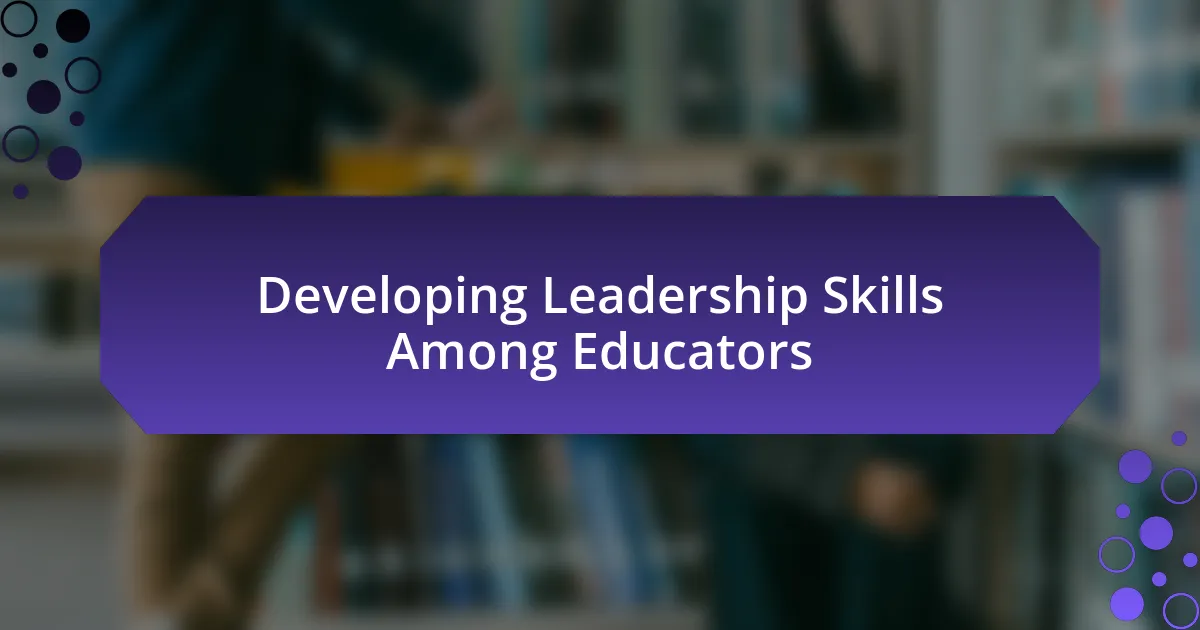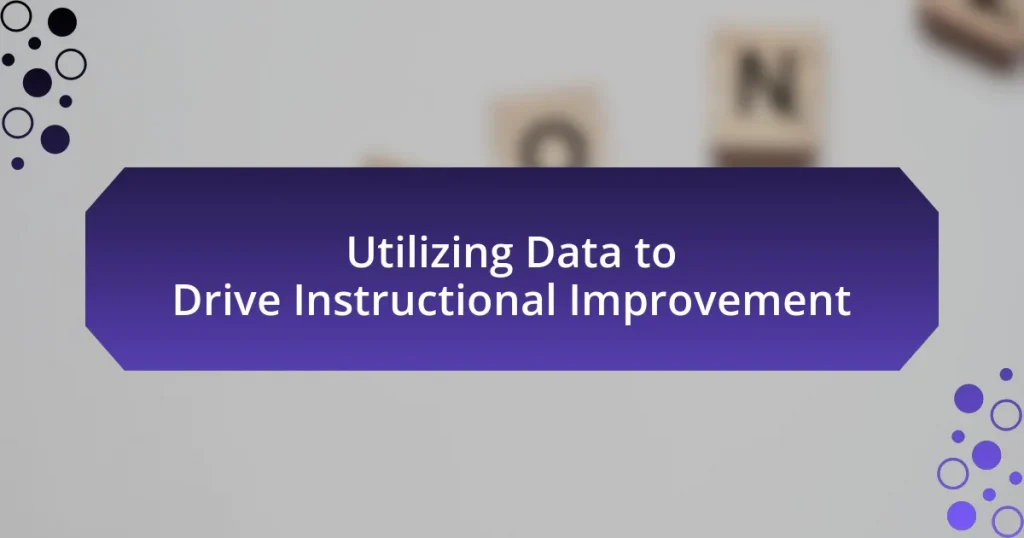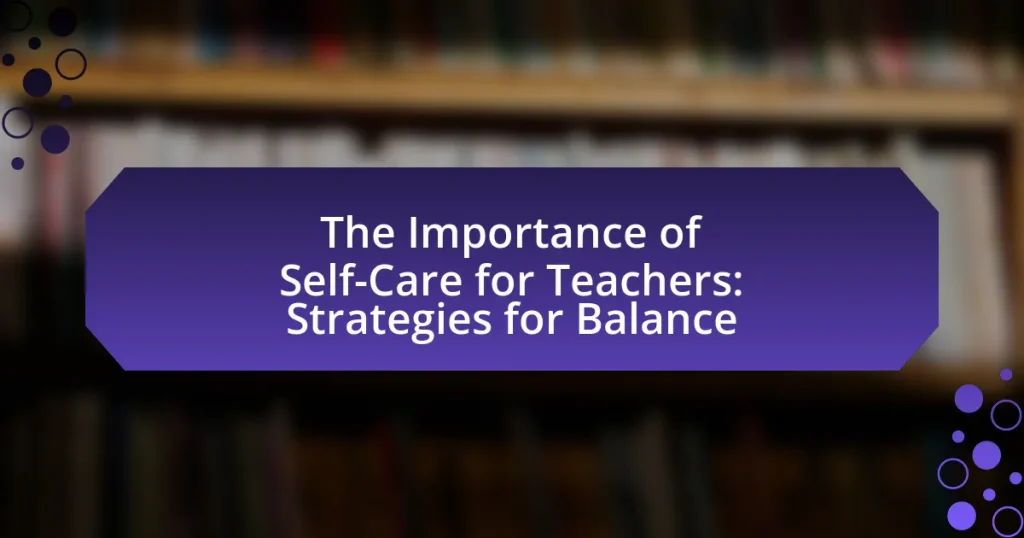Developing leadership skills among educators is essential for fostering a positive educational environment and improving student outcomes. The article outlines the significance of leadership skills in education, highlighting their impact on collaboration, communication, and school culture. It discusses specific skills necessary for effective leadership, such as emotional intelligence and decision-making, and examines the challenges educators face in developing these skills, including limited professional development opportunities and institutional barriers. Additionally, the article explores strategies for skill enhancement, including mentorship, professional learning communities, and reflective practices, while emphasizing the long-term benefits of strong leadership in education, such as improved student achievement and teacher retention.
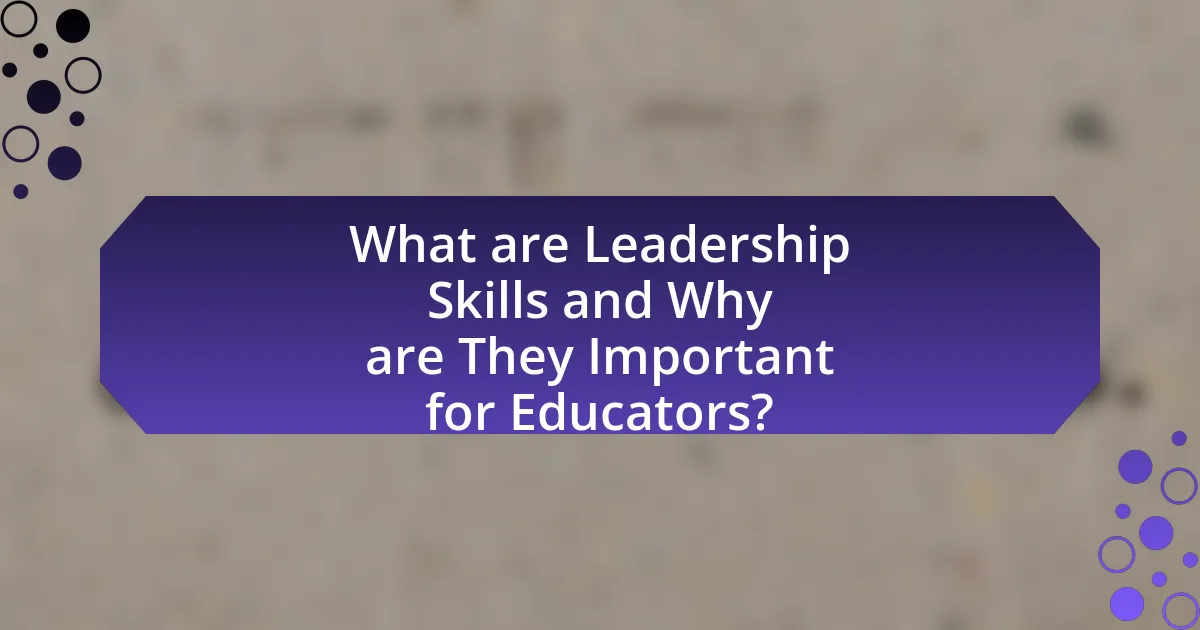
What are Leadership Skills and Why are They Important for Educators?
Leadership skills are the abilities that enable individuals to guide, influence, and inspire others towards achieving common goals. For educators, these skills are crucial as they foster a positive learning environment, enhance collaboration among staff, and improve student outcomes. Research indicates that effective leadership in educational settings can lead to higher student achievement, as demonstrated by a study from the Wallace Foundation, which found that strong leadership is second only to classroom instruction in its impact on student learning. Therefore, developing leadership skills among educators is essential for creating effective educational institutions.
How do leadership skills impact the educational environment?
Leadership skills significantly enhance the educational environment by fostering collaboration, improving communication, and driving positive change. Effective leaders in education create a culture of trust and respect, which encourages teachers and students to engage actively in the learning process. Research indicates that schools with strong leadership see higher student achievement and teacher satisfaction, as leaders set clear goals and provide support for professional development. For instance, a study by Leithwood and Jantzi (2000) found that leadership practices directly correlate with student performance, demonstrating that effective leadership is crucial for creating a productive educational atmosphere.
What specific leadership skills are essential for educators?
Effective communication, emotional intelligence, and decision-making are essential leadership skills for educators. Effective communication enables educators to convey ideas clearly and foster collaboration among staff and students. Emotional intelligence allows educators to understand and manage their own emotions while empathizing with others, which is crucial for building strong relationships within the school community. Decision-making skills empower educators to analyze situations, consider various perspectives, and make informed choices that positively impact student learning and school culture. Research indicates that schools led by emotionally intelligent leaders show improved teacher satisfaction and student outcomes, reinforcing the importance of these skills in educational leadership.
How do these skills influence student outcomes?
Developing leadership skills among educators significantly enhances student outcomes by fostering a positive learning environment and improving instructional practices. Educators with strong leadership abilities can effectively motivate students, create collaborative classroom cultures, and implement innovative teaching strategies. Research indicates that schools led by effective leaders show higher student achievement; for instance, a study by Leithwood and Jantzi (2000) found that leadership accounted for approximately 25% of the variation in student achievement across schools. This correlation underscores the critical role that leadership skills play in shaping educational success.
What challenges do educators face in developing leadership skills?
Educators face several challenges in developing leadership skills, including limited professional development opportunities, lack of administrative support, and insufficient time for collaboration. Limited professional development often results from a focus on curriculum delivery rather than leadership training, which hinders educators’ ability to cultivate necessary skills. Additionally, when school administrators do not prioritize or support leadership initiatives, educators may feel discouraged from pursuing leadership roles. Furthermore, the demanding nature of teaching leaves little time for educators to engage in collaborative practices that foster leadership growth, such as mentoring or peer coaching. These factors collectively impede the development of effective leadership skills among educators.
What barriers exist within educational institutions?
Barriers within educational institutions include inadequate funding, lack of professional development opportunities, and resistance to change. Inadequate funding often leads to limited resources, affecting the quality of education and the ability to implement leadership programs. A study by the National Center for Education Statistics indicates that schools with higher funding levels are more likely to offer comprehensive professional development, which is crucial for developing leadership skills among educators. Additionally, resistance to change can stem from entrenched practices and a lack of support for innovative approaches, hindering the adoption of effective leadership training initiatives.
How can personal beliefs and experiences hinder leadership development?
Personal beliefs and experiences can hinder leadership development by creating biases that limit an individual’s ability to adapt and grow in diverse environments. For instance, educators who hold rigid beliefs about teaching methods may resist adopting innovative practices, thereby stunting their professional growth. Research indicates that leaders with fixed mindsets are less likely to embrace feedback and change, which is crucial for effective leadership (Dweck, 2006). Additionally, negative past experiences can lead to a lack of confidence, causing educators to shy away from leadership roles or opportunities for collaboration. This resistance to change and collaboration ultimately impedes the development of essential leadership skills necessary for fostering a positive educational environment.
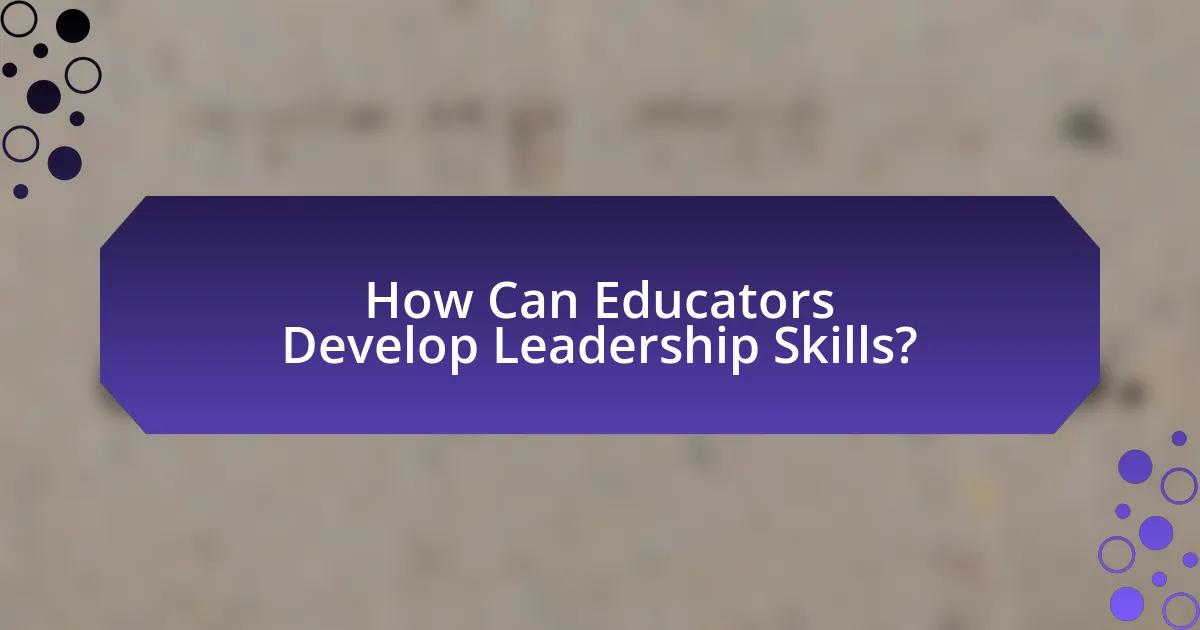
How Can Educators Develop Leadership Skills?
Educators can develop leadership skills through targeted professional development programs, mentorship opportunities, and collaborative learning experiences. Professional development programs, such as workshops and courses focused on leadership strategies, provide educators with essential tools and frameworks to enhance their leadership capabilities. Research by the Learning Forward organization indicates that effective professional development can lead to improved teaching practices and student outcomes. Additionally, mentorship from experienced leaders allows educators to gain insights and guidance, fostering their growth in leadership roles. Collaborative learning experiences, such as peer coaching and team projects, encourage educators to practice leadership in real-world contexts, further solidifying their skills.
What training programs are available for educators?
Training programs available for educators include professional development workshops, online courses, mentorship programs, and certification programs focused on leadership skills. These programs are designed to enhance teaching effectiveness and leadership capabilities. For instance, the National Board for Professional Teaching Standards offers certification that emphasizes leadership in education, while organizations like ASCD provide various workshops and online courses aimed at developing leadership skills among educators. Additionally, many universities offer graduate programs in educational leadership that equip educators with the necessary skills to lead in their institutions.
How do mentorship and coaching contribute to skill development?
Mentorship and coaching significantly enhance skill development by providing personalized guidance and feedback tailored to individual needs. This relationship fosters a supportive learning environment where educators can explore new strategies, reflect on their practices, and receive constructive criticism. Research indicates that mentorship programs can lead to improved teaching effectiveness, as evidenced by a study published in the “Journal of Educational Psychology,” which found that teachers who participated in mentorship reported a 30% increase in their instructional skills over a year. Additionally, coaching has been shown to improve specific competencies, such as classroom management and instructional techniques, leading to better student outcomes.
What role do professional learning communities play?
Professional learning communities (PLCs) play a crucial role in developing leadership skills among educators by fostering collaboration, continuous improvement, and shared accountability. PLCs create structured environments where educators can engage in meaningful discussions about teaching practices, share resources, and reflect on student outcomes. Research indicates that schools with effective PLCs experience higher levels of teacher efficacy and student achievement, as collaboration leads to the implementation of innovative teaching strategies and professional growth. For instance, a study by Vescio, Ross, and Adams (2008) in the “Journal of Educational Change” found that teachers in PLCs reported increased confidence in their instructional practices and a greater commitment to student learning.
What strategies can educators implement to enhance their leadership abilities?
Educators can enhance their leadership abilities by engaging in continuous professional development, fostering collaborative environments, and utilizing reflective practices. Continuous professional development, such as attending workshops and pursuing advanced degrees, equips educators with the latest pedagogical strategies and leadership theories. Research indicates that educators who participate in ongoing training demonstrate improved leadership skills and student outcomes.
Fostering collaborative environments involves creating teams where educators can share best practices and support each other, which has been shown to enhance collective efficacy and leadership capacity. A study by Hattie (2017) highlights that collaboration among educators significantly impacts student achievement and teacher effectiveness.
Utilizing reflective practices, such as self-assessment and peer feedback, allows educators to critically evaluate their leadership styles and make necessary adjustments. According to Schön (1983), reflective practice is essential for professional growth, enabling educators to learn from their experiences and improve their leadership capabilities.
How can self-reflection improve leadership skills?
Self-reflection can significantly improve leadership skills by enabling leaders to assess their strengths and weaknesses, leading to more informed decision-making. When educators engage in self-reflection, they can identify areas for personal growth and adapt their leadership styles to better meet the needs of their teams and students. Research indicates that reflective practices enhance emotional intelligence, which is crucial for effective leadership. For instance, a study published in the “Journal of Educational Leadership” found that educators who regularly practiced self-reflection reported higher levels of empathy and communication skills, both essential for successful leadership. This process fosters a deeper understanding of one’s impact on others, ultimately leading to more effective and responsive leadership.
What practices foster collaboration among educators?
Practices that foster collaboration among educators include regular professional development workshops, co-teaching models, and the establishment of professional learning communities. Regular professional development workshops provide educators with opportunities to share best practices and learn from one another, enhancing their collaborative skills. Co-teaching models allow educators to work together in the classroom, promoting teamwork and shared responsibility for student outcomes. Professional learning communities create structured environments where educators can engage in ongoing dialogue about teaching strategies and student learning, leading to improved collaboration. Research indicates that schools implementing these practices see increased teacher satisfaction and improved student performance, highlighting the effectiveness of collaboration in educational settings.
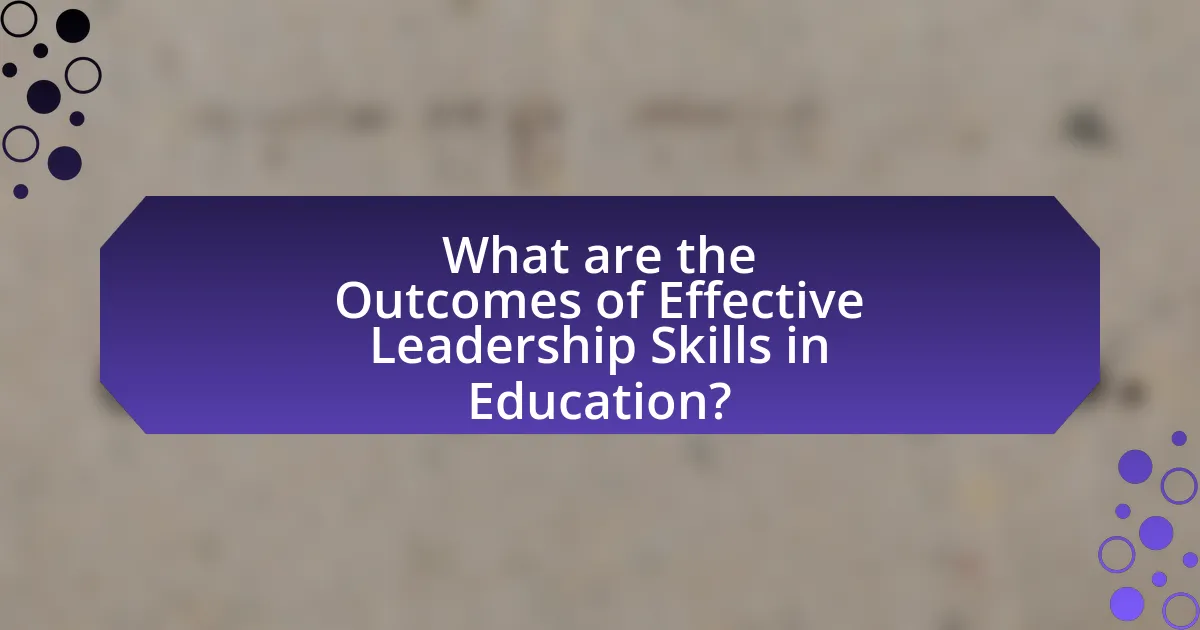
What are the Outcomes of Effective Leadership Skills in Education?
Effective leadership skills in education lead to improved student outcomes, enhanced teacher performance, and a positive school culture. Research indicates that schools with strong leadership demonstrate higher student achievement, as effective leaders create a vision and foster an environment conducive to learning. For instance, a study by Leithwood and Jantzi (2000) found that leadership accounted for approximately 25% of the variation in student achievement across schools. Additionally, effective leaders support professional development for teachers, which enhances instructional practices and boosts teacher morale. This correlation between leadership and educational success underscores the critical role that effective leadership plays in shaping educational environments.
How do strong leadership skills affect school culture?
Strong leadership skills positively influence school culture by fostering an environment of collaboration, trust, and high expectations. Effective leaders set clear visions and goals, which align the efforts of teachers, students, and staff towards common objectives. Research indicates that schools with strong leadership experience improved student outcomes, as leaders who communicate effectively and support professional development create a more engaged and motivated staff. For instance, a study by Leithwood and Jantzi (2000) found that transformational leadership significantly enhances school climate, leading to increased student achievement and teacher satisfaction.
What changes can be observed in teacher morale and collaboration?
Changes in teacher morale and collaboration often manifest as increased job satisfaction and enhanced teamwork among educators. Research indicates that when leadership skills are developed among educators, it leads to a more positive school climate, which in turn boosts teacher morale. For instance, a study by the Wallace Foundation found that effective leadership practices, such as shared decision-making and professional development opportunities, significantly improve teachers’ sense of efficacy and collaboration. This improvement is evidenced by higher retention rates and a more cohesive teaching community, demonstrating that fostering leadership skills directly correlates with positive shifts in morale and collaborative efforts among teachers.
How does effective leadership influence student engagement?
Effective leadership significantly enhances student engagement by fostering a positive school culture and promoting collaborative learning environments. Leaders who communicate a clear vision and set high expectations create an atmosphere where students feel valued and motivated to participate actively in their education. Research indicates that schools with strong leadership demonstrate higher levels of student engagement, as effective leaders implement strategies that encourage student voice and choice, leading to increased ownership of learning. For instance, a study by Leithwood and Jantzi (2000) found that transformational leadership positively correlates with student engagement, highlighting the importance of supportive leadership in driving student involvement in academic and extracurricular activities.
What are the long-term benefits of developing leadership skills among educators?
Developing leadership skills among educators leads to enhanced student outcomes, improved school culture, and increased teacher retention. Educators with strong leadership abilities can effectively inspire and motivate students, resulting in higher academic performance and engagement. Research indicates that schools with effective leadership see a 20% increase in student achievement (Leithwood & Jantzi, 2000). Furthermore, strong leadership fosters a positive school environment, which is crucial for collaboration and innovation among staff. This supportive culture contributes to higher job satisfaction and reduces turnover rates, as studies show that schools with effective leaders experience 30% lower teacher attrition (Grissom et al., 2015). Overall, the long-term benefits of developing leadership skills among educators significantly impact both educational quality and workforce stability.
How can leadership skills lead to career advancement for educators?
Leadership skills can significantly lead to career advancement for educators by enhancing their ability to influence, inspire, and manage teams effectively. Educators who demonstrate strong leadership qualities are often recognized for their capacity to drive positive change within their institutions, which can result in promotions to administrative roles or leadership positions such as department heads or curriculum coordinators. Research indicates that schools with effective leadership see improved student outcomes and teacher satisfaction, which underscores the value of leadership skills in educational settings. For instance, a study by the Wallace Foundation found that effective school leadership is second only to classroom instruction in its impact on student learning, highlighting how leadership capabilities can elevate an educator’s career trajectory.
What impact does effective leadership have on educational policy and reform?
Effective leadership significantly influences educational policy and reform by fostering a culture of collaboration and innovation among educators. Leaders who effectively communicate a clear vision and set high expectations can drive systemic changes that improve student outcomes. For instance, research by the Wallace Foundation indicates that strong leadership is linked to improved student achievement, as effective leaders implement evidence-based practices and support teacher development. Additionally, effective leaders advocate for policies that prioritize equitable access to resources, thereby addressing disparities in education. This alignment of leadership with policy initiatives creates a framework for sustainable reform that enhances the overall educational landscape.
What practical tips can educators follow to enhance their leadership skills?
Educators can enhance their leadership skills by actively seeking professional development opportunities, such as workshops and training programs focused on leadership. Engaging in collaborative projects with colleagues fosters teamwork and communication, essential components of effective leadership. Additionally, educators should practice reflective teaching, which involves assessing their own teaching methods and seeking feedback to improve their effectiveness. Research indicates that educators who participate in leadership training programs report increased confidence and improved decision-making skills, which are critical for effective leadership in educational settings.
